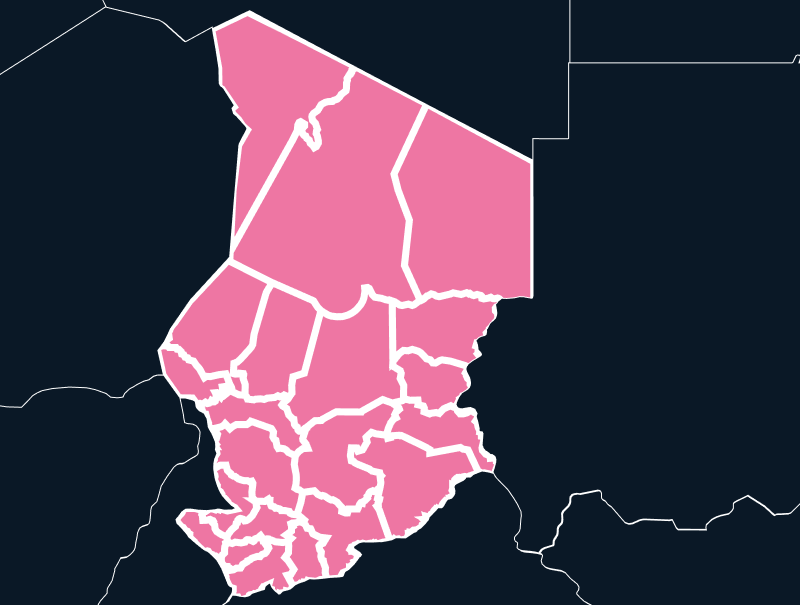Asia
Shipping to Chad
Chad may not be the first country that comes to mind when you think of tech growth in Africa, but that’s quickly changing. As one of Central Africa’s most resource-rich and politically stable nations in recent years, Chad is taking meaningful steps to position itself as a digital contender. From the government’s ambitious “Chad Connexion 2030” initiative to its growing appetite for imported technology, the country is steadily opening its doors to international business.

Tax
Up to 18%
Duty
Up to 30%
Lead Times
6-7 Weeks
Trade Restriction
Second-Hand Goods
Best Carrier Option
Freight Forwarder
Non-Working Days
Saturday, Sunday, and Public Holidays
Prominent Languages
French; Arabic
Why Tech Companies Are Looking to Chad
Despite the hurdles, Chad is quietly becoming a land of opportunity for companies in the tech and infrastructure sectors. The government’s $1.5 billion digital transformation project is already underway, aiming to boost internet penetration, build out public-sector digital services, and complete fiber optic connections to neighboring countries. This is opening the door for an influx of imported networking systems, server hardware, cybersecurity tools, and more.
There’s also movement in the renewable energy space. Chad has an abundance of sunlight and is aiming to become less reliant on imported fuel, making it a promising market for solar energy systems and storage solutions. As digital adoption grows, so does the need for data centers—a sector that, while still in its infancy, shows real promise due to Chad’s stable power grid and business-friendly energy costs.
Population
21.1 M
Biggest Industry by Export
Crude Petroleum
Capital City
N’Djamena
Biggest Industry by Import
Broadcasting Equipment
Chad’s participation in the African Continental Free Trade Area (AfCFTA) also opens new doors. As the continent’s economies become more integrated, trade between African nations is expected to accelerate. For companies with long-term goals in the region, getting established in Chad now could offer strategic access to Central African markets in the years ahead.
Understanding the Chad Import Landscape
Chad’s economy has historically relied heavily on oil exports and agriculture, but recent developments suggest a shift is on the horizon. With the government actively investing in digital infrastructure, there’s a growing demand for technology imports, from cloud computing systems to telecommunications hardware.
For businesses exploring the market, it’s important to understand that Chad’s imports are tightly regulated. Imports often require detailed documentation, proper HS code classification, and in many cases, licenses or special permits, especially when the goods involve pharmaceuticals, radio equipment, or encrypted technologies.
Labeling must meet local language requirements (French and Arabic), and customs authorities can be unpredictable, with occasional delays caused by bureaucratic red tape or inconsistent interpretation of trade rules. Post-import obligations like document retention and compliance audits further complicate matters. For many companies, especially those importing high-value or sensitive goods, the risk of non-compliance is simply too high to ignore.
The Challenges of Importing into Chad
It’s impossible to discuss trade in Chad without addressing its practical and geopolitical challenges.
First, Chad’s landlocked location adds a layer of transshipping complexity to every shipment. Most goods enter through the port of Douala in Cameroon and must travel overland, often taking weeks from the point of origin to the final destination. This isn’t just an inconvenience—it drives up logistics costs and introduces greater risk of delay or damage.
Second, the customs environment in Chad is notoriously difficult to navigate. Importers face a complicated mix of national standards, regional trade agreements, and local enforcement practices. Corruption, inconsistent documentation requirements, and a lack of transparency are well-documented challenges. A shipment that seems fully compliant on paper can still be held at the border if local authorities spot a minor issue.
The regulatory environment for technology is rigorous. Items like encrypted communications devices, wireless transmitters, and pharmaceutical tech often require clearance from multiple ministries, and approval timelines are rarely predictable.
Even once goods are cleared, businesses must be prepared for ongoing compliance demands, such as maintaining records, reporting imports to the relevant agencies, and ensuring local labeling remains current.
Countries That Trade With Chad
Africa
Benin
Europe
Belgium
Why an Importer of Record (IOR) and Exporter of Record (EOR) in Chad is Crucial for Success
Shipping to Chad isn’t straightforward. As a landlocked nation with complex import procedures, challenging infrastructure, and a strict regulatory environment, navigating Chad’s trade space requires more than just a shipping partner. ou need a full-service compliance expert on your side.
At TecEx, we specialize in just that. Whether you’re moving IT hardware, networking equipment, or sensitive encrypted devices, we make your import experience seamless, compliant, and cost-efficient through our EOR solution in Chad and turnkey import services.
How TecEx Makes Importing to Chad Easy
When it comes to shipping to Chad, we believe complexity shouldn’t stand in the way of opportunity. Our solution is simple: remove the friction, reduce the risk, and take on the burden of compliance so you don’t have to.
Through our IOR/EOR in Chad service, TecEx becomes your legal importer of record, eliminating the need for you to establish a local entity. That means we handle everything, from obtaining the correct import licenses and navigating customs procedures to ensuring your goods are compliant with Chadian regulations and delivered safely to their final destination.
Our team of local experts and trade compliance professionals knows the ins and outs of Chad imports better than anyone. And because Chad’s post-import requirements can be just as demanding as the import itself, we also manage your documentation archive to ensure you’re prepared for future audits or inquiries.
We help you:
Classify goods properly to avoid overpaying duties
Navigate import license requirements
Ensure labeling and documentation meet local standards
Mitigate risks tied to customs delays or asset seizures
Is Chad Right for Your Next Project? Let’s Talk.
Chad is not the easiest market, but for the right businesses, it’s a smart one. Its digital transformation is underway, its government is signaling openness to international partnerships, and its need for advanced technology is growing every day.
With TecEx by your side, you won’t have to figure it out alone. We offer a turnkey solution that removes the regulatory guesswork, shortens lead times, and ensures your shipments arrive in Chad smoothly and compliantly. Whether you’re delivering networking equipment, encrypted tech, or medical devices, we’ve got you covered.
Take the Guesswork Out of Shipping to Chad.
Now’s the time to plan ahead. Reach out to us for the latest updates and start preparing your entry into one of Africa’s most promising emerging tech markets.



